Norton vs Webroot 2025: How Do These Antiviruses Stack Up?
Norton is one of the leaders in the antivirus space, while Webroot claims that it can perform on par with the best security apps out there. So, I put both these antiviruses through a rigorous series of tests to see if Webroot can compete with a top antivirus like Norton.
Webroot has several highlights, like its lightweight apps and 70-day money-back guarantee. However, I can safely conclude after my tests that Norton outperforms Webroot in almost every scenario. Norton has more features, better customer support, a reliable VPN, and a 100% malware detection rate compared to Webroot’s 95%.
So, while Webroot’s lightweight apps, decent malware detection rate, and impressive money-back guarantee make it worth considering, Norton is still far superior. Plus, you can try Norton completely risk-free as it’s backed by a 60-day money-back guarantee.
No Time? Here’s a 1-Minute Summary of Category Winners
I put Norton and Webroot through various tests, and Norton was the better performer almost every time. Norton has a better malware detection rate in scans, blocks more real-time threats, and has more features for added security. Also, Norton’s customer support is better as it offers 24/7 live chat, which Webroot doesn’t.
 |
 |
|
| Virus Scanner | Has 3 different scans that detect 100% of malware | Offers 4 scans that detect 95% of malware |
| Real-Time Malware Protection | Blocks 100% of real-time threats and zero-day malware | Often fails to block threats in real time |
| System Performance | Negligible impact on system performance | Lightweight apps that don’t affect system performance |
| VPN | Built-in VPN with AES 256-bit encryption | Doesn’t have a built-in VPN |
| Parental Controls | Feature-rich suite of parental controls | No parental controls |
| Firewall | Secure, intuitive, and customizable firewall | Has a secure firewall but it isn’t customizable at all |
| Password Manager | Effective built-in password manager | Includes LastPass password manager |
| Gaming Mode | Norton GO improves performance while gaming | Has a gaming-focused plan but it doesn’t deliver worthwhile performance benefits |
| Optimization Tools | Multiple 1-click optimization tools | Basic optimizer that frees up space |
| Other Features | Many other features including its PC SafeCam, encrypted cloud storage, and software updater | Offers up to 25GB of cloud storage and a sandbox for testing unsafe apps |
| Device Compatibility | Protects Windows, macOS, iOS, and Android devices | Works on Windows, macOS, iOS, and Android |
| Customer Service | Provides 24/7 live chat, phone support, and an online knowledge base | Offers phone support, email support, and an online knowledge base |
| Price | Offers great value for money on each of its plans | Multiple plans but they don’t deliver the best value for money |
| Free Trial | Offers a free trial but it requires a credit card | Doesn’t require a credit card to sign up for its free trial |
| Money-Back Guarantee | 60-day money-back guarantee | 70-day money-back guarantee |
How I Tested and Compared Norton vs Webroot
To see which one of these antiviruses provides better security, I compared Norton and Webroot across 15 categories, which include:
- Virus Scanner — I tested the available virus scans in each antivirus to see which one detects a higher percentage of malware.
- Real-Time Malware Protection — I checked how reliably both security apps safeguard me against real-time threats.
- System Performance — I analyzed the impact of these apps on my system’s performance.
- VPN — I checked if these antiviruses have built-in VPNs and whether they’re worth using.
- Parental Controls — I looked at whether either antivirus offers parental controls and if these controls offer worthwhile protection.
- Firewall — I analyzed the firewalls available in both antiviruses to see which one is more secure and customizable.
- Password Manager — I checked if these security apps have password managers and whether they can effectively protect your credentials.
- Gaming Mode — I looked at whether you get a gaming mode with either antivirus and if their gaming modes benefit gaming performance.
- Optimization Tools — I tested the available optimization tools in each security app to see if they provide noticeable performance improvements.
- Other Features — I analyzed each antivirus’ feature list to see which one offers better protection.
- Device Compatibility — I checked which antivirus works on more platforms.
- Customer Service — I spoke to both security apps’ customer support through all available channels to test their responsiveness and helpfulness.
- Price — I compared all the price plans for both antiviruses to see which one provides better value for money.
- Free Trial — I checked if either antivirus offers a free plan and if their free plans provide worthwhile security.
- Money-Back Guarantee — I looked at how long the money-back guarantee is for each antivirus and tested their refund policy to see if they live up to it.
1. Virus Scanner — Norton Has a Much Better Malware Detection Rate
Norton’s virus scans are consistently impressive and outperformed Webroot’s scans in all my tests. You can run the following scans using these security apps:
| Norton | Webroot |
| Quick Scan | Quick Scan |
| Full System Scan | Full Scan |
| Custom Scan | Deep Scan |
| – | Custom Scan |
Both antiviruses offer quick, full, and custom scans, but Webroot also offers a Deep Scan. According to its app, the Deep Scan detects rootkits, trojans, and various threats that other scans won’t identify. Norton doesn’t offer this scan, but it doesn’t need it as its Full System Scan effectively finds all kinds of malware.
During my tests, Norton’s scans detected 100% of the malware in my system. Its Quick Scan took just 2 minutes, while the Full System Scan took around 15 minutes to complete.
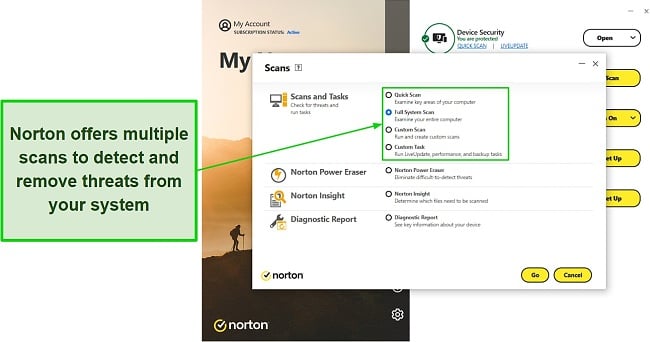
Webroot’s quick scan is faster than Norton’s, but its scans have a much lower malware detection rate of 95%. In my tests, Webroot’s Quick Scan only took a minute, but the Full Scan took over an hour, so it’s not as fast. Unfortunately, Webroot’s scans missed multiple malware files I hid across my test system, meaning they aren’t as reliable.
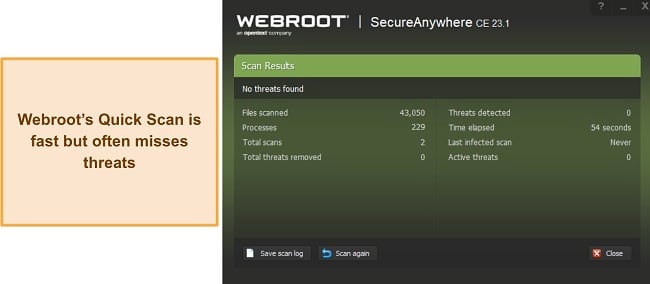
Webroot has more scans, but effectiveness is more important. Since Norton’s scans are much better at finding and eliminating malware, it wins in this category.
Virus Scanner Winner: Norton
2. Real-Time Malware Protection — Norton Detects and Blocks Every Single Real-Time Threat
Norton provides much better security against real-time threats and zero-day malware. I tested both security apps’ real-time security, and Norton blocked 100% of real-time malware, while Webroot missed many malicious files.
I first tested these apps by attempting to download malware samples from EICAR, and Norton blocked every malicious file I tried to download, including those in zip files. Norton’s reliable security against real-time threats is mainly thanks to its AI-based SONAR analysis tool, which monitors process behavior to detect malware. In contrast, Webroot only blocked 5 of the 10 malicious samples I downloaded and completely missed the malware in zip files.
Webroot has some other tools for real-time protection, like a Rootkit Shield, USB shield, script shield, web shield, and phishing protection. Its web shield effectively highlights safe websites with a green tick while placing a red exclamation mark next to malicious websites. Also, Webroot’s phishing protection effectively blocks 97% of all phishing attacks.
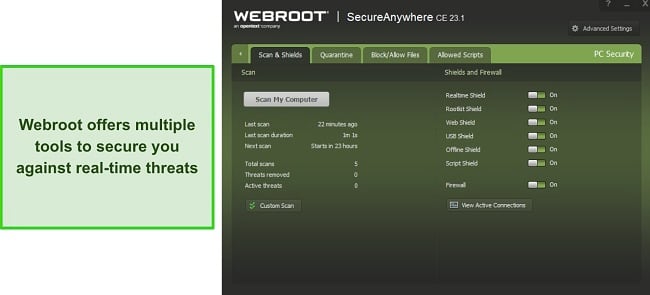
Norton’s web protection is equally as effective and keeps you safe on the web. Any time you do a web search, it automatically marks safe and unsafe websites to ensure you don’t open malicious links. Also, it immediately blocks attempts to open malicious sites and provides reports on why a website is dangerous.
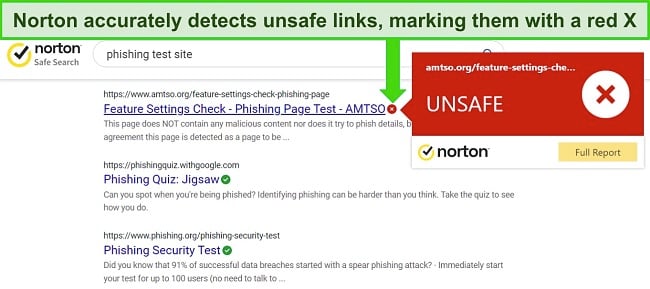
Overall, while both security apps deliver excellent web protection and reliable real-time protection tools, Norton is the winner here. It has a 100% detection rate against zero-day malware and stops you from downloading any malicious files onto your system.
Real-Time Malware Protection Winner: Norton
3. System Performance — Neither Antivirus Slows Down System Performance
One thing I like about these antiviruses is that you don’t even notice them running in the background. Both Norton and Webroot are lightweight antiviruses that don’t take up a lot of system resources, meaning you won’t experience slowdowns while using them.
I tested both security apps’ effects on performance by doing tasks like opening websites, playing games, and copying files while they ran in the background. I didn’t notice any performance slowdowns while using Norton or Webroot. Of course, results may vary depending on your system’s specs. However, the following table will give you an idea of what to expect:
| Norton | Webroot | |
| Slowdown when opening websites | 13% | 12% |
| Slowdown when copying files locally | 3% | 7% |
| Slowdown when launching applications | 7% | 9% |
Afterward, I tested how many resources they use while idle and during full scans, and got the following results:
| Idle CPU Usage (Average) |
Idle Memory Usage (Average) |
Idle Disk Usage (Average) |
Full Scan CPU Usage (Max) | Full Scan Memory Usage (Max) |
Full Scan Disk Usage (Max) |
|
| Norton | 2% | 210MB | 5MB/s | 58% | 413MB | 216MB/s |
| Webroot | 3% | 68MB | 2MB/s | 24% | 262MB | 86MB/s |
While Webroot consumes a lot fewer resources, neither antivirus uses enough to slow down system performance. Overall, it’s a tie between the two apps here since neither of them slows down your system.
System Performance Winner: Tie
4. VPN — Norton’s Built-in VPN Is Secure and Reliable
You won’t get a built-in VPN with Webroot, but Norton offers one of the best built-in VPNs with its antivirus. It uses industry-standard AES 256-bit encryption to safeguard your online activity and keeps you completely anonymous as you surf the web.
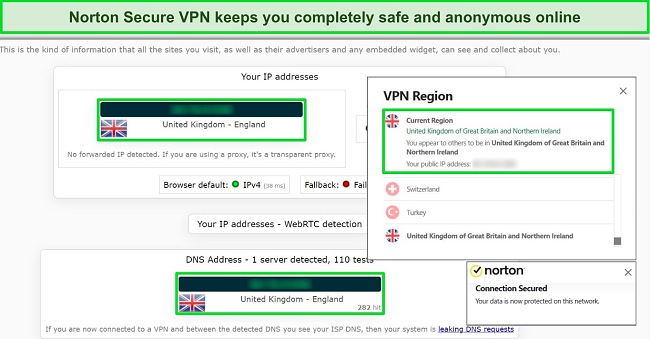
Norton’s VPN offers servers in 30+ countries, and I got consistently fast speeds on the servers I tested. On average, my connection speed dropped roughly 27% when connected to Norton’s VPN, with a maximum drop of 36% on long-distance servers.
My team and I also tested its streaming performance, and Norton’s VPN unblocked most popular services, including Netflix, HBO Max, Disney+, and Prime Video. Of course, it also offers various other features, including the following:
- Kill Switch — Disconnects you from the internet to keep you anonymous if the VPN connection drops.
- No-logs Policy — Doesn’t keep logs of your activity on its servers.
- Split Tunneling — Lets you choose what traffic gets routed through the VPN tunnel.
Overall, Norton offers an excellent VPN with fast connection speeds and top-grade security. Since Webroot doesn’t even have a VPN, Norton is the clear winner here.
VPN Winner: Norton
5. Parental Controls — Norton Offers a Useful and Thorough Suite of Parental Controls
Among Norton’s most impressive features is its excellent parental control suite, while Webroot doesn’t have parental controls at all. Norton’s parental controls provide intuitive tools to manage and monitor your children’s online activity. Also, they’re easy to set up since you simply have to log into the Norton Family app onto your kid’s device and set a profile.
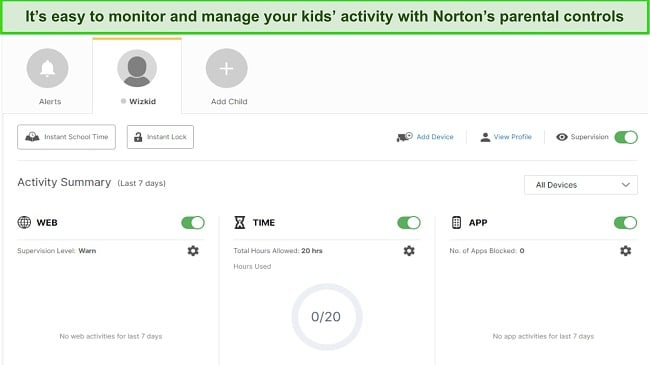
You can use Norton’s parental controls to track how long your kids use their devices, what apps they use, and what websites they visit. Also, they easily let you filter websites, block apps, and even lock the device if necessary.
I especially like the location tracking feature in Norton’s parental control, as it lets you stay aware of your kids’ location at all times. Plus, there’s a neat “School Time” function that temporarily blocks distracting apps and only lets your kids use the internet for online learning.
Norton’s parental controls are some of the best you can get in an antivirus, thus making it the winner in this category.
Parental Controls Winner: Norton
6. Firewall — You’ll Find Many More Customization Options in Norton’s Firewall
Although both antiviruses offer a secure firewall, I was disappointed to learn that Webroot’s firewall isn’t customizable. Webroot’s firewall is a decent first line of defense that’ll warn you if untrusted processes connect to the internet, but you can’t configure it at all. Most antiviruses, including Windows’ built-in security app, come with some firewall customization options, so it’s unfortunate that Webroot doesn’t.
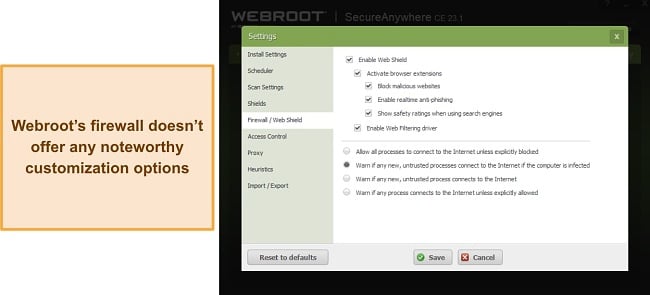
Norton’s firewall is far more intuitive and customizable. It’s pre-configured to deliver excellent security out of the box and also offers an easy-to-use interface that makes further configuration easy.
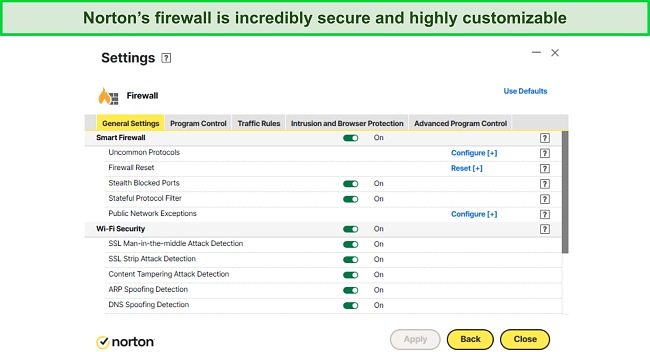
The firewall settings in Norton have convenient toggles that quickly let you adjust its general settings, traffic rules, and every other aspect to your liking. Plus, it provides excellent WiFi security by protecting against tampering attacks, man-in-the-middle attacks, SSL strip attacks, and spoofing.
Overall, Norton wins here because you can’t go wrong with its firewall’s reliable security and thorough customization options.
Firewall Winner: Norton
7. Password Manager — Both Security Apps Provide an Excellent Password Manager
While I was impressed with the password managers in both security apps, I consider Norton’s password manager a more trustworthy and reliable option. My main reason for this is that Webroot uses LastPass’ password manager, which suffered a breach in August, and a subsequent one in November.
In terms of features, Webroot’s password manager is quite solid. It secures your passwords with industry-standard AES 256-bit encryption and provides two-factor authentication (2FA) for added security. Plus, it offers neatly organized storage that makes browsing through your saved passwords easy.
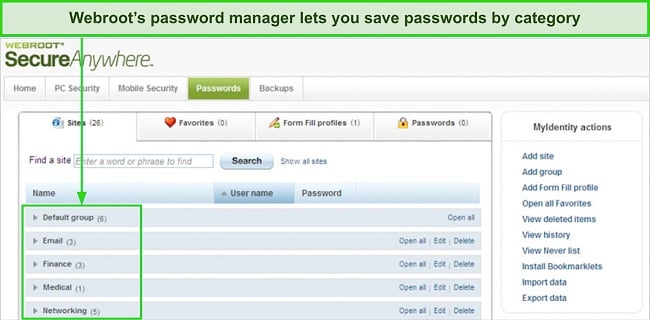
Webroot’s password manager also provides extensions for Chrome, Edge, Firefox, and Opera, meaning you can easily auto-fill forms on websites using stored credentials.
Norton’s password manager is just as impressive. It has unlimited password storage, works on all major platforms, and safeguards your credentials with unbreakable AES 256-bit encryption.
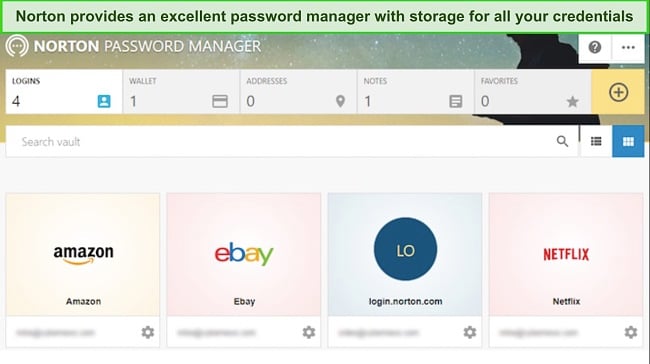
You can use Norton’s password manager to secure your passwords, card details, addresses, notes, and various other details. One of its best features is the auto-change feature, which generates strong passwords to replace your weak passwords on different websites — all in one click.
Overall, while the password managers in both security apps are excellent, I’m leaning towards Norton because of LastPass’ recent breaches.
Password Manager Winner: Norton
8. Gaming Mode — Norton GO Provides Worthwhile Performance Boosts for Gamers
You won’t find a gaming mode in Webroot, but Norton GO (Game Optimizer) is one of the best gaming modes in an antivirus. I want to highlight that it’s only available in the Norton 360 for Gamers plan. However, since Norton GO makes such a big difference, you should consider this plan if you want the best possible gaming performance.
Norton GO detects whenever you’re playing a game and allocates maximum resources towards it to ensure there isn’t any lag or stuttering. I also like that it completely silences notifications while you’re gaming to prevent any interruptions.
During my tests, I used Norton GO with Counter-Strike: Global Offensive, Call of Duty: Modern Warfare ll, and League of Legends and noticed clear improvements. The games averaged at least 10–15 more FPS than they do without Norton GO, meaning the performance boost is significant.
On the other hand, Webroot doesn’t even include a gaming mode, which means Norton wins here.
Gaming Mode Winner: Norton
9. Optimization Tools — Norton’s 1-Click Optimization Tools Help Improve and Monitor System Performance
Norton is much better for device optimization. It offers multiple simple yet useful 1-click optimization tools that help free up space and enhance your system’s performance. Plus, its Graphs feature helps you monitor device performance to see what needs improvement. The optimization tools include:
- Optimize Disk — Checks drives for fragmentation and defragments them.
- Startup Manager — Disables programs at startup for a faster boot time.
- File Cleanup — Removes temporary files and other junk to free up space on your system.
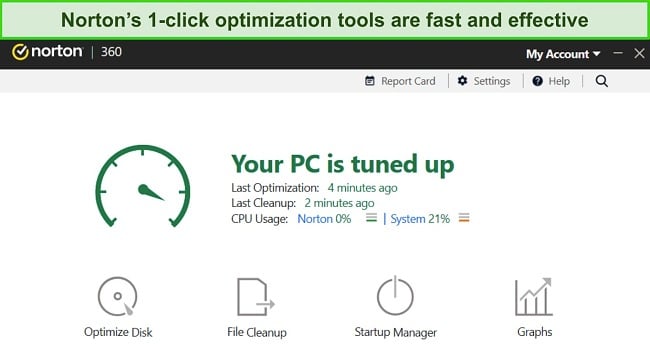
Webroot also offers a System Optimizer feature, though it isn’t nearly as useful as Norton’s suite of optimization tools. It’s effective at freeing up space and helped me remove over 1GB of junk files from my system, which is great but doesn’t speed up your system in any way.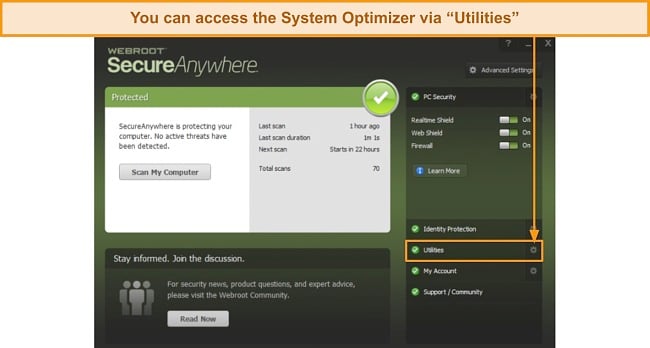
Overall, Norton wins in this category as its optimization tools improve device performance alongside freeing up space.
Optimization Tools Winner: Norton
10. Other Features — Norton Is a Much More Feature-Rich Antivirus
Norton is better than Webroot if you want an antivirus with multiple additional features for extra security. Alongside its VPN, password manager, and optimization tools, Norton provides several useful features to keep you safe, which include:
- PC SafeCam — Prevents unauthorized access to your system’s webcam
- Secure Cloud Storage — Provides up to 250GB (in the US) of encrypted cloud storage.
- Software Updater — Keeps all your apps updated to ensure they don’t have any vulnerabilities.
- Privacy Monitor — Finds your personal information on data broker sites and helps remove it.
Norton’s secure cloud storage is especially impressive and uses AES 256-bit encryption to safeguard your data. Its industry-standard encryption makes it perfect for storing sensitive files and documents you don’t want others to see. Also, Norton’s cloud storage lets you schedule backups at weekly, monthly, or manually defined intervals.
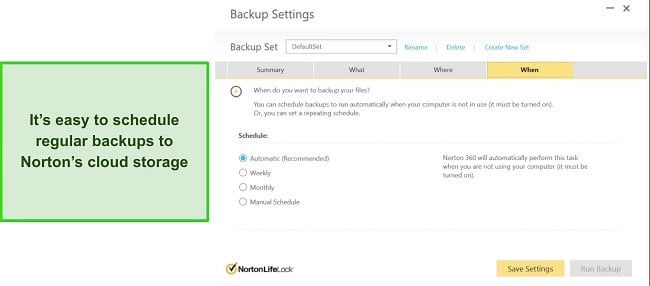
While it’s not as feature-rich as Norton, Webroot offers some useful extra features to provide additional security. It has cloud storage, but only on its most premium plan. Also, its cloud storage is capped at 25GB, much less than the potential 250GB (in the US) you can get with Norton.
Among Webroot’s more impressive features is the SafeStart Sandbox. This tool provides an isolated environment where you can test and run potentially dangerous files to see if they’re malicious. SafeStart Sandbox also lets you set various parameters for the test environment to recreate specific scenarios.
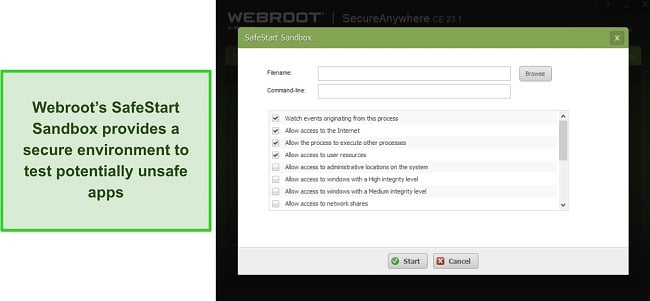
Overall, while Webroot has some useful extra features, Norton wins here as it’s the more feature-rich option.
Other Features Winner: Norton
11. Device Compatibility — Both Apps Have Intuitive Apps for All Major Platforms
You can use Norton to protect Windows, macOS, iOS, and Android devices, and the same goes for Webroot.
Webroot’s Windows and macOS apps are easy to install and even easier to use because of their minimalistic designs. You can download the setups from Webroot’s website and follow the steps to install the app in minutes. Plus, its mobile apps for Android and iOS are also intuitive, and you can install them within seconds from either platform’s app store.
Norton’s apps also have beginner-friendly designs on every platform. They have neatly presented menus that are simple to navigate through. It’s effortless to browse the various menus to find and use any of Norton’s features.
Overall, you can’t go wrong with either antivirus in terms of device compatibility and ease of use, meaning it’s a tie here.
Device Compatibility Winner: Tie
12. Customer Service — Norton Offers 24/7 Live Chat, Which Webroot Doesn’t
Although Webroot and Norton offer various support channels, Norton’s customer support is easily among the best you can get with an antivirus. It offers multiple ways to get in touch with an agent if you need help, with its 24/7 live chat being my preferred choice.
Whenever I used Norton’s live chat support, I connected to an agent in a minute or two at most. Also, every Norton agent I’ve spoken to has been knowledgeable about the security app and always gave helpful responses to my queries.
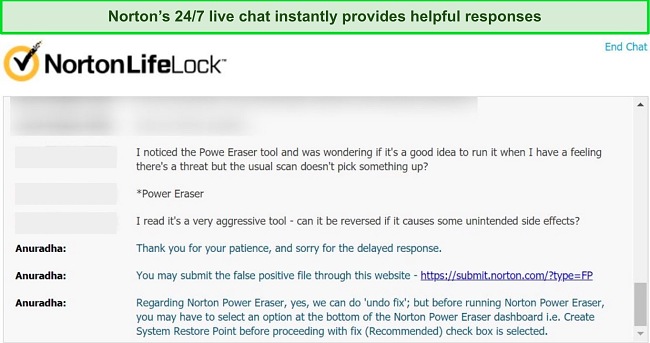
Norton also offers 24/7 phone support, a community forum, and one of the most detailed online knowledge bases there is for an antivirus.
Webroot provides decent customer support, but it’s not nearly as fast as Norton’s. Webroot support’s biggest downside is the lack of 24/7 live chat, meaning you must submit a ticket and wait for an email response. It took nearly 20 hours to get an answer when I sent a ticket asking about some of the app’s features, but the response was detailed and helpful.

You can also contact Webroot’s support via phone, but this is only available if you’re in the US, UK, Australia, or Ireland. Unlike Norton’s support, there’s a long wait before you connect to an agent, but they’re all knowledgeable and will provide the help you need. Also, Webroot’s website hosts a massive knowledge base with tutorials and other useful information about the app.
Webroot’s customer support is decent, but it’s a lot slower than Norton’s and doesn’t offer live chat, so Norton is the winner here.
Customer Service Winner: Norton
13. Price — Norton’s Plans Offer Better Value for Money
Each antivirus offers multiple plans. After thoroughly analyzing their plans, I found that Norton delivers more value for your money. It offers the following:
- Antivirus Plus — The basic plan that protects 1 device with Norton’s core antivirus features, firewall, and 2GB of secure cloud storage.
- 360 Standard — Includes all of Antivirus Plus’ features but also includes Norton’s VPN, Dark Web Monitoring, and protection for up to 3 devices.
- 360 Deluxe — Has everything in 360 Standard and offers Norton’s parental controls and Privacy Monitor. Also, this plan increases the cloud storage to 50GB and protects up to 5 devices.
- 360 Select — Provides all the above features, 250GB of cloud storage, Norton’s ID Theft Protection, and secures up to 10 devices.
Each of Norton’s plans delivers superb value, but I suggest getting Norton 360 Deluxe. This plan lets you protect up to 5 devices, offers a hefty 50GB of cloud storage (in the US), and includes all of Norton’s core security features.
Webroot also offers various reasonably priced plans you can choose from, which include:
- SecureAnywhere Antivirus — Offers Webroot’s core antivirus features and firewall for 1 macOS or Windows device.
- Internet Security Plus — Provides Webroot’s antivirus, web protection, and protection for up to 3 devices. Also, this plan lets you secure Android and iOS devices alongside Windows and macOS.
- Internet Security Complete — Offers Webroot’s optimization tools and protection for 5 devices alongside the features in Internet Security Plus.
- Webroot Premium — Has all the above features and provides Webroot’s ID theft protection.
Among Webroot’s plans, I found that Internet Security Plus delivers the best value. It protects all platforms and secures up to 3 devices. The ID protection and optimization tools on the higher-tier plans aren’t worth the price.
Norton’s plans deliver much better value for your money compared to their Webroot counterparts, meaning it wins here.
Price Winner: Norton
14. Free Trial — Webroot’s Free Trial Doesn’t Require a Credit Card
Neither of these antiviruses has a free plan, but I was pleased to see that both provide a free trial. Webroot offers a 14-day free trial, while Norton’s trial duration varies based on your region. US users get a 7-day free trial for Norton, while you can get up to 30 days if you’re in the UK.
I especially like that Norton’s free trial lets you test all its features completely risk-free. It includes Norton’s antivirus, firewall, unlimited VPN, cloud storage, password manager, and every other key feature within the app. On the other hand, Webroot’s free trial only includes the features in its Internet Security Plus plan.
It’s worth noting that Webroot’s free trial doesn’t require a credit card. Just sign up with your email, download the security app, and you’ll get 14 days to test it. On the other hand, Norton’s free trial requires you to sign up with a credit card before you can download the trial. This distinction makes Webroot’s free trial stand out more and is why I’m calling it the winner here.
Free Version Winner: Webroot
15. Money-Back Guarantee — Webroot Has a Longer Money-Back Guarantee
Both apps offer a money-back guarantee, and they’re longer than what you get with most antiviruses. Norton offers a 60-day money-back guarantee, meaning you have two months to test it risk-free.
On the other hand, Webroot provides a 70-day money-back guarantee, which is among the longest I’ve seen from an antivirus subscription. I was also pleased to see that it’s easy to claim a refund for either antivirus if you’re unsatisfied with your purchase.
After testing Norton for a few weeks, I contacted its live chat support and asked for a refund, which they approved in minutes. Afterward, I had my money back in 5 working days. As for Webroot, I filled out the refund request form on its website after my tests and almost instantly received an email confirming my refund. Webroot refunded my money within 36 hours, which is quite fast.
While both these antiviruses have reliable money-back guarantees, Webroot is the winner here because of its longer guarantee and quicker refunds.
Money-Back Guarantee Winner: Webroot
And the Winner Is… Norton
I thoroughly tested both security apps, and Norton emerged as the better choice. It beats Webroot in 11 out of 15 categories. Also, both apps tied in 2 categories, and Webroot won in only 2.
- Virus Scanner — Norton
- Real-Time Malware Protection — Norton
- System Performance — Tie
- VPN — Norton
- Parental Controls — Norton
- Firewall — Norton
- Password Manager — Norton
- Gaming Mode — Norton
- Optimization Tools — Norton
- Other Features — Norton
- Device Compatibility — Tie
- Customer Service — Norton
- Price — Norton
- Free Trial — Webroot
- Money-Back Guarantee — Webroot
Webroot has its strengths, like the lightweight apps, lengthy money-back guarantee, and support for all major platforms. Unfortunately, it doesn’t live up to its claim of stacking up against the best antiviruses because Norton outperforms it in terms of security, features, and support.
Nonetheless, Webroot can still be a solid choice if you want decent protection against common malware and threats on all your devices. Plus, the generous 70-day money-back guarantee means you have a long time to test Webroot risk-free on your devices.
However, if you want comprehensive security against every possible cyberthreat, Norton is a must-have. It provides flawless 100% malware detection, excellent customer support, and many useful features to add extra layers of security. Also, you can try Norton completely risk-free since it’s backed by a 60-day money-back guarantee.
Overall Winner: Norton
How To Install Norton on Windows
- Choose a plan from Norton’s website — Browse through Norton’s various plans and select the one that fits your preferences.
![Screenshot of Norton's available plans]()
- Sign up and pay for your subscription — Enter your email and payment details to subscribe to your plan and sign up for Norton.
![Screenshot of Norton's sign-up and payment page]()
- Download Norton from its web portal — Sign into Norton’s web portal and press the Download button to get its Windows setup.
![Screenshot of Norton's web portal]()
- Install Norton — Run the setup and follow all the on-screen instructions to install Norton on your system.
![Screenshot of Norton's setup in progress]()
- Secure your system using Norton — After installing it, you can use Norton’s scans, firewall, and other security features to safeguard your system.
![Screenshot of Norton's main menu after installation]()
After these steps, you’ll have Norton installed on your system and can use it to safeguard your device from threats.
FAQs About Norton and Webroot
Is Webroot better than Norton?
No, Norton is better than Webroot. I consider Norton the superior antivirus because it offers a 100% malware detection score, better feature variety, and responsive customer support. Plus, its plans deliver much better value for money.
You can also try Norton completely risk-free as it’s backed by a generous 60-day money-back guarantee.
Who owns Webroot?
Can Norton and Webroot work together?
Which Webroot version should I get?
Webroot offers multiple plans you can choose from, but I suggest getting Internet Security Plus. This plan may not have all the features of the app, but it includes Webroot’s basic antivirus features, a password manager, and can protect up to 3 devices.
Although Webroot’s Internet Security Plus plan delivers good value, you should consider Norton’s 360 Deluxe plan to get the best value for your money. This plan provides Norton’s core anti-malware features, 50GB of cloud storage (in the US), protection for up to 5 devices, and more.
How can I install Norton on my device?
Installing Norton on your device is easy. Just use the following steps:
- Choose a plan. Pick a Norton plan that fits your requirements.
- Subscribe and sign up. Sign up and subscribe by entering your email and payment details.
- Download Norton. Download the setup from Norton’s web portal.
- Install Norton. Run the setup to install Norton on your device.
- Use Norton. Secure your system with Norton’s scans and other features.
Which one is the best overall antivirus?
While both Norton and Webroot have various strengths, I consider Norton the best overall antivirus. Norton outperforms Webroot and most other competitors in malware detection, features, customer support, pricing, and more. Plus, Norton’s generous 60-day money-back guarantee gives you a long time to test it risk-free.
Of course, there are also several other top-tier antiviruses you can pick from, each with its highlights.


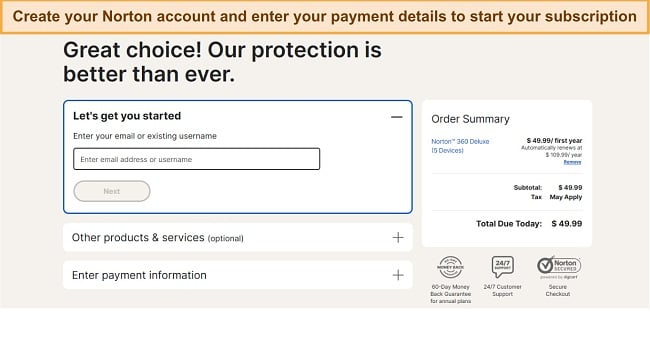
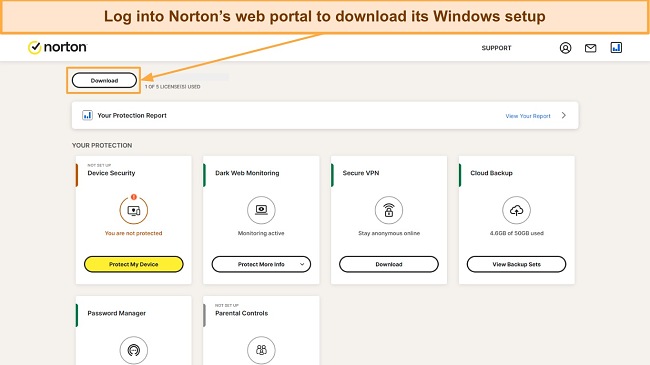
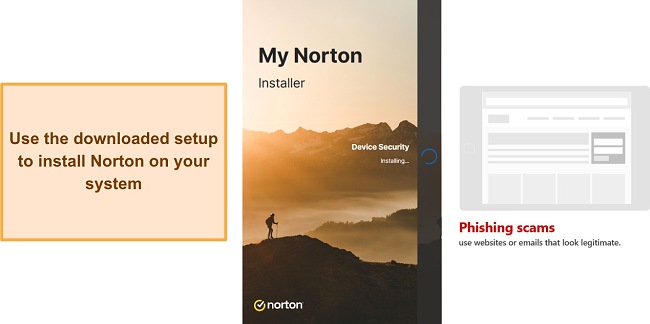
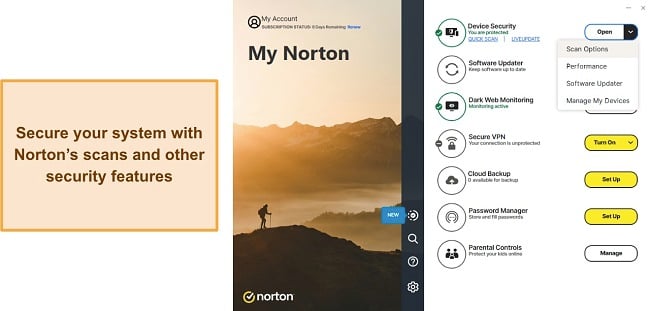



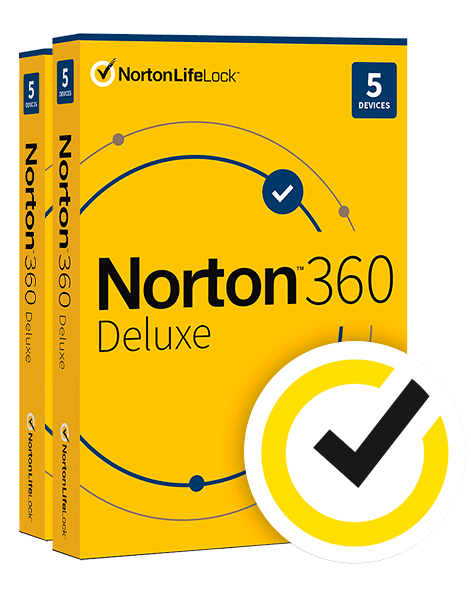
Leave a Comment
Cancel